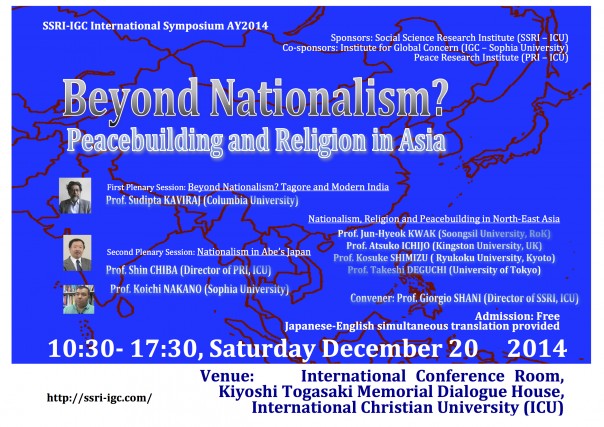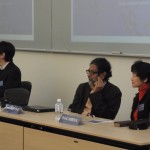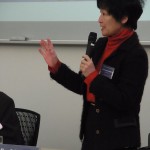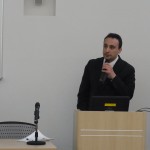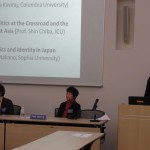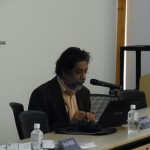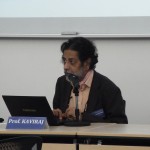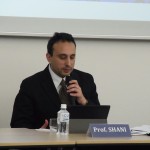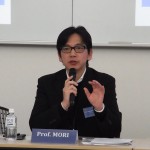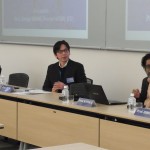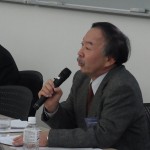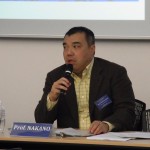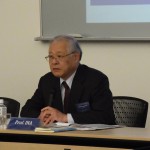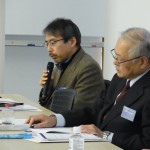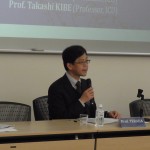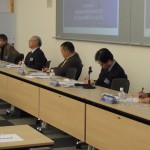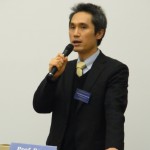- タゴールと批判的ナショナリズム
スディプタ・カヴィラジュ(コロンビア大学教授)【略歴】
要旨(E)I shall argue that Tagore, and Gandhi as well occupied an unusual position on the question of nationalism. They realized that successful opposition to British colonial rule required the spread of a collective sentiment across the different social groups in Indian society: an anti-imperialist nationalism. Yet Tagore showed deep concern at the career of nationalist ideas in world history – particularly the form it assumed in Europe. He was wary of the institutions of a typical European style nation-state; and did not want Indian society to develop nationalism in that form. This produced a very interesting form of nationalist reflection in Tagore. The lecture will illustrate his deep and complex reflections on a critical form of nationalism from his political writings and literary texts.
討論者: ジョルジオ・シャーニー(ICU社会科学研究所所長)
司会:毛利勝彦(ICU教授)
- 岐路に立つ日本政治と東アジアの将来:
憲法破壊、靖国ナショナリズム、平和構築 の課題千葉眞(ICU平和研究所所長) 【略歴】
要旨(E)This paper will deal with the following three issues: 1) Critique of a series of anti-constitutional measures such as the Cabinet’s decision about the use of collective self-defense right which were made on July 1 this year. And I will argue that these measures signify coup d’etat against the Constitution on the part of the Abe administration. (2) Critique of Yasukuni nationalism of Prime Minister Abe and its defining features. (3) Finally, I will suggest a few things about the need for non-military security measures in East Asia today by referring to recent developments of the theories and practices of peace-building, cooperative security, reconciliation and peace, and so on.
日本における歴史、政治、アイデンティティ
中野晃一(上智大学教授)【略歴】
要旨(E)The politics of national identity and historical memory continues to play a key role in shaping the international relations of Northeast Asia today. This chapter seeks to shed light on the vexing regional situation by offering an account of the issues from a Japanese perspective. In order to do so, I shall first provide an analysis of what is often termed the “Yasukuni view of history” (Yasukuni shikan). We shall then take an overview of the postwar contestation over historical narratives, with particular reference to the textbook issue. It is important to note that, between the mid-1980s and the mid-1990s, with the rise of a certain liberal/neoliberal, internationalist orientation that became dominant in the newly politically assertive and economically affluent Japan, serious political efforts to reach settlements (if not solutions) over the “history” issues with China and South Korea were made by the country’s ruling elites. This was, however, followed by a revisionist backlash since the late 1990s that challenged and undid the fragile compromise with its neighbors as a revisionist, nationalist orientation took over in Japan, shaken by the social disruptions caused by a globalizing economy, and now on relative decline in Northeast Asia. Finally, this chapter closes by placing the impact of the resurgence of the Yasukuni view of history in the contemporary regional context.
討論者: 稲正樹(ICU教授)
討論者: 木部尚志(ICU教授)
司会:寺田俊郎(上智大学教授)
-
互恵的非支配の宗教ナショナリズム:安昌浩の人道的コスモポリタニズム
– カク・ジュニョク(崇實大學校准教授)【略歴】
要旨(E)This paper examines Ahn Changho’s writings which arguably referred not only to his longing for national independence but also to his aspiration of peaceful coexistence in Northeast Asia. Although it has been frequently noted that the connection between Ahn’s advocacy of national independence and his suggestion of humanitarian cosmopolitanism may have been much closer than is usually assumed, there were only a few scholarly attempts to see about his conception of non-domination in terms of a coherent logic as something bracketing together with mutually exclusive extremes. By juxtaposing Ahn’s political thoughts with Giuseppe Mazzini’s then-popular thesis on ‘one’s love for humanity,’ I make the following two claims. (1) Ahn retains the politics of non-domination that gives epistemological coherence to his ideas ranging from the advocacy of the reconstruction of the nation to the assertion of peaceful coexistence in Northeast Asia. (2) Ahn’s conception of non-domination embodied in his religious aspiration for love for humanity demonstrates the need for overcoming the simple antinomies between resistance and coexistence on the one hand, and between national and cosmopolitan on the other hand.
転覆と抵抗の契機:日本帝国におけるナショナリズム/帝国主義思想の意図しない帰結
– 一條都子 (キングストン大学准教授)【略歴】
要旨(J)ナショナリズム、特に帝国主義の文脈で展開するナショナリズムは、一般的に、同質化を通した支配に寄与する全体主義的な思想、換言すれば抑圧の手段と考えられている。本稿では、この広く共有された見解を、思想が意図しない結果を生み出す過程のいくつかを考慮することで検討する。特に、日本帝国主義・ナショナリズムによって抑圧・征服された人々が日本帝国主義支配を転覆、もしくはそれに抵抗するために、帝国主義的・ナショナリスティックな思想を利用することに成功したと見られる、密接に関連した三つの契機を検討する。三つの契機とは、世界史的立場、東亜協同体構想および日鮮同祖論である。京都学派によって展開された世界史的立場は、世界の現実のより包括的、すなわちより真正な理解を目的としており、二十世紀前半の日本の帝国主義的拡張の知的背景となったと広く見なされている。しかし、世界史的立場は、「真の」普遍性を希求するため、自己拡張的なナショナリズムや国民国家といった枠組みに見られる特殊性を拒絶する性質をも有している。短命に終わった東亜協同体構想は、世界史的立場に基づく知的枠組み内で展開されたが、アジアの民衆の間の普遍性および共通点を強調するため、帝国臣民間の平等を認めざるを得ないという矛盾を抱えていた。そのためこの構想には、征服された側が同質化に抵抗し、その特殊性、特に権利を保護する手段として使われる可能性を秘められていた。本稿で示すように、少数の左翼朝鮮人知識人は、帝国主義克服の可能性を東亜協同体構想に見出していた。彼らはまた、東亜共同体構想と共に謳われた日鮮同祖論に、朝鮮民族らしさの抹消ではなくその保全の可能性を見ていた。彼らの試みは限られており、また短命で、はっきりとした結果には結びつかなかった。こういった試みがあったということは、日本帝国主義の残虐さを軽んじることにはつながらない。本稿の目的は、抑圧・征服された人々が抑圧者の思想を動員して抑圧に抵抗しようとする方法を検討することで、思想としてのナショナリズムの理解の深化にあたってより主体性を尊重した方法を提案することである。
仏教、理性、大東亜共栄圏:戦前期の日本における多文化主義とナショナリズム
– 清水耕介(龍谷大学教授)【略歴】
要旨(E)Despite the wide-spread understanding of the pre-war Japan, the society of the nation of the time can be characterized with its multicultural political orientation. This does not necessarily mean that Japan was actively engaged in accepting diversity of races, but it was an inevitable consequence of the expansion of its political territory, which naturally brought diverse races under control of imperial Japan. Multiculturalizing Japan was not an easy task, and certainly needed a core of political body which was to ensure the unity of the expanding imperial body. This presentation critically investigates the role religion and philosophy performed in the context of Japan’s imperialism, and introduces retrospect religious and philosophical self-reflections of the post-war period which bring us a cautionary tale in engaging in contemporary international politics of post-modernity.
日本の近代と二つのナショナリズム:権威主義的独裁とナルシシズム的攻撃性
– 出口剛司(東京大学准教授)【略歴】
要旨(J)ナショナリズムがもつイデオロギー的な力は、両義的である。なぜならば、それは一方で抑圧された人々に力を与え、自己を解放し、政治的独立と自由を勝ち取らせると同時に、他方で少数民族に対する迫害をたやすく合理化してしまうからである。そして多くの歴史的事例が示すように、こうした解放と迫害の局面を表面的な言説の水準で区別するのは極めて困難である。したがって、個人を超えて集合的な意識に訴え、人々の振る舞いを動機づけ、イデオロギーを産出する内的な力を解明することが重要となる。とくに、個々の言説やイデオロギーにおいて、いかなる種類の暴力が支配しているかを明らかにする必要があるのである。本研究では、『自由からの逃走』の著者であるエーリッヒ・フロムが発展させた「分析的社会心理学」を導入し、観察可能なナショナリズム言説の背後に隠された支配や攻撃への内的、社会心理学的な衝動を解明することをめざす。実際、フロムや彼の伝記執筆者であると同時に最後のアシスタントでもあったライナー・フンクは、二種類の暴力、すなわち「権威主義的」独裁支配と「ナルシシズム的」攻撃性を区別し、その区別にしたがって、戦前の国家社会主義と戦後のネオ・ナチズムとの区別を行っている。本研究では、彼らの議論に立脚しつつ、分析的社会心理学の理論と方法を展開し、続いて日本の天皇制ファシズムを「伝統的権威主義」と定義する。そして最後に、近年の極右イデオロギーを深層で規定する暴力構造をナルシシズム的攻撃性の観点から明らかにする。
討論者: 木部尚志(ICU教授)
討論者: ソー・ジェジョン(ICU上級准教授)
司会:ヴィルヘルム・フォッセ(ICU教授)
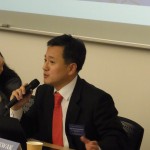
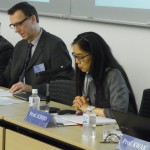
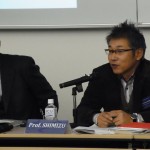
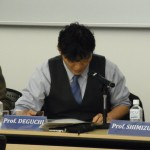
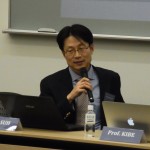
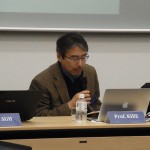
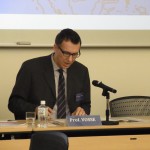
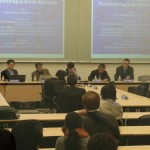
- 閉会の辞
長谷川ニナ(上智大学教授、IGC)
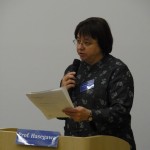
- 開催趣旨
第一次世界大戦から100年が経ったことで、アジアではまだ見過ごされているが、ナショナリズムのもたらす危機の兆候が現れてきている。ベンガルの詩人でノーベル賞受賞者のラビンドラナート・タゴールは、戦争が拡大する最中、日本で行われた講演において国民国家を批判し、国民国家から独立した社会の構想を示した。本シンポジウムでは、特にアジアとヨーロッパについて、そのような構想に関する問題を提起しようと試みる。他のBRICS諸国とともに、中国やインドの目覚ましい台頭が世界政治における西欧の覇権に対して大きな挑戦となっているにもかかわらず、現代国際関係(IR)では、政治共同体の支配的な形態は依然として国民国家である。ヨーロッパ政治史の産物である国民国家モデルは、まずヨーロッパ列強がアジアの大半を植民地化することで強制的にグローバル化し、その後は脱植民地化を通して拡大してきた。
しかしながら、日本では、国民国家は明治維新後に採用され、既存の民族的基盤の上に築かれた「自然な」政治共同体として広く受け入れられている。近年では、第二次世界大戦以来沈黙を続けていた日本の「エスノ・ナショナリズム」が復活し、また中国がナショナリストのレトリックを多用することによって、地域の平和と安定は脅かされている。このような状況は、台湾も領有を主張する尖閣諸島をめぐる領土問題で頂点に達している。東アジアにおけるエスノ・ナショナリズムの台頭は、多くの点で、先に出現した南アジアの宗教ナショナリズムを反映しており、それはインドとパキスタン両国の核兵器保有が引き起こす更なる危険をも映し出している。インド人民党(BJP)と、その党首であり、物議をかもしているナレンドラ・モディが地域の平和と安定にどのような影響を与えるかは現時点では不明である。
社会科学研究所と上智大学グローバル・コンサーン研究所によって共同で開催される第34回目の本シンポジウムでは、次の問題を提起することによって、アジアにおける平和の可能性を批判的に検討する。アジアの中でナショナリズムの台頭に対抗するために何ができるだろうか。もしできるならば、地域の平和構築において異教徒間の対話はどのような役割を果たし得るだろうか。

